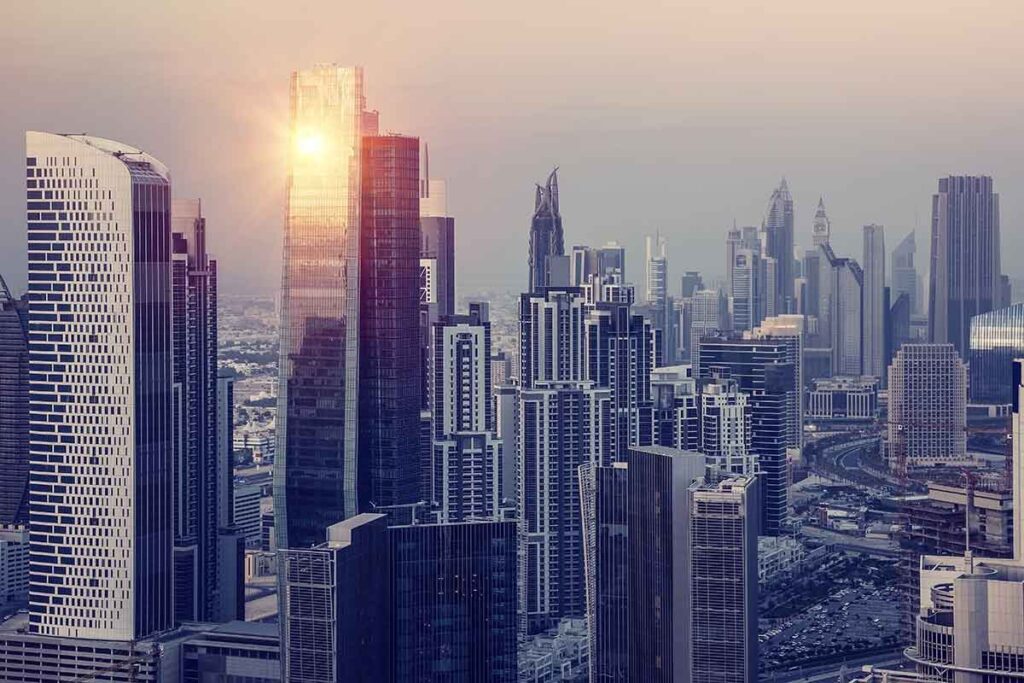Experts at a panel discussion predicted that the UAE’s real estate market would continue to grow in 2024 despite a weakening outlook for the world. Dubai and Abu Dhabi are expected to deliver about 34,000 and 8,000 units, respectively.
Robust economic fundamentals, government initiatives, and increased investor confidence are driving new opportunities for sustained growth across asset classes in the UAE’s rapidly evolving market, especially in the short and medium term, panelists said at JLL’s “Navigating the growth spectrum: Exploring Strategies for sustained success” event.
According to them, the real estate industry in particular is anticipated to keep up its positive trend and expand on the robust expansion and high levels of buyer demand witnessed in 2023.
A strong and resilient real estate sector has established itself as a solid pillar of the UAE’s diversification agenda, according to James Allan, CEO of JLL’s Middle East and Africa (MEA) division. He added that the sector is predicted to perform well in 2024 despite pressure from inflation.
“The positive outlook for growth and upward trends in the investment climate offer stability in a time of global uncertainty, reinforcing the UAE’s position as an attractive choice for regional and international real estate investors.”
During the panel discussion, the industry veterans predicted that although the volume and value of residential transactions have been rising annually, the rate of growth will probably slow down in the coming year.
Luxury real estate is still a niche market, but co-living spaces—which offer young, single professionals accessible, convenient, and inclusive living options—as well as branded homes, wellness, and lifestyle-focused real estate projects are growing steadily, they claimed.
“Despite escalating land prices and construction costs, the positive momentum of the UAE’s residential market is expected to continue in 2024 with Dubai and Abu Dhabi anticipated to deliver approximately 34,000 units and 8,000 units respectively,” they said.
Property Monitor, a top provider of real estate technology and market intelligence, predicts that after nearly 100,000 new units were introduced in 2023, Dubai’s thriving residential market will see the delivery of over 40,000 units in 2024. According to a recent report by Property Monitor, the housing sector, which experienced the biggest annual price increase of 16.4% in more than a decade last year, will keep adding to the strong pipeline of supply that will be delivered in the years to come.
At a JLL panel discussion, speakers discussed the improved prospects for the real estate industry in the larger Gulf Cooperation Council (GCC), which is less vulnerable to the global challenges of inflation and interest rate hikes, due to the rise in private and sovereign wealth as well as increased infrastructure spending.
“The positive sentiment and performance of various macroeconomic indicators reflect trust and resilience both in the UAE and GCC markets, even as Dubai continues its run as a dominant force in the region’s property sector,” said the JLL experts.
The UAE’s position as a financial and business hub has strengthened demand across the major asset classes and global institutions are actively eyeing investment opportunities in the country, they noted. “Buoyed by its high desirability index, residential, hospitality, and office remain the top-performing segments in the UAE. Commercial real estate represents a competitive landscape with supply-demand gaps for high-quality spaces. Core asset classes continue to generate interest in the UAE’s capital market and the aggressive pricing strategy pursued by asset managers witnessing prime office and hospitality yields about to break the 7.0 per cent threshold.”
They claim that a greater emphasis on sustainability and technological advancements is further changing the real estate market, where energy-efficient designs and green building techniques are becoming more and more popular and essential. Financial institutions have increased the amount of competitive loans they offer for environmentally friendly projects.
Launches of luxury off-plan properties have increased in Dubai. The most in-demand residential segment is under Dh3 million, which gives developers more options to satisfy the public’s increasing demand for reasonably priced housing.
Both cities showed a high demand for office space in the office market. Due to a lack of good space and an increase in occupier inquiries, rents increased, keeping the market firmly in the landlord’s favor. The demand for flex offices surged due to changing work patterns and remote working opportunities, while Grade A offices were in short supply despite a growing preference for quality over quantity.
Speakers emphasized that the industrial sector is being stimulated by a strong demand for high-quality logistics and warehousing solutions, with the UAE leading the GCC and ranking seventh globally on the Logistics Performance Index. The manufacturing and logistics sector is experiencing growth due to government-led initiatives like Operation 300 billion, UAE Industrial Strategy 2030, and Made in the UAE. The growth of these sectors is expected to be driven by 3PLs and e-commerce.
